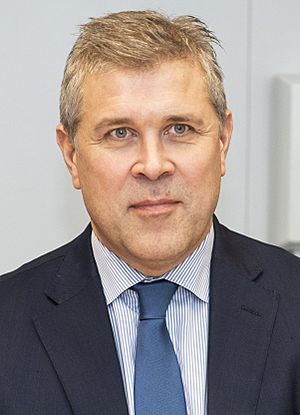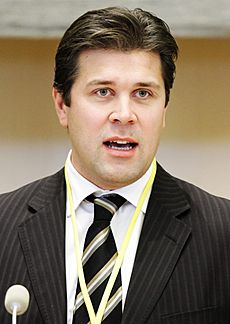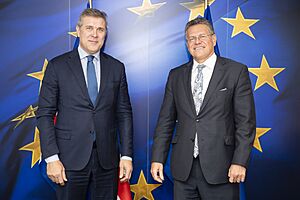Bjarni Benediktsson (born 1970) facts for kids
Quick facts for kids
Bjarni Benediktsson
|
|
|---|---|

Bjarni in 2023
|
|
| Prime Minister of Iceland | |
| In office 9 April 2024 – 21 December 2024 |
|
| President | Guðni Th. Jóhannesson Halla Tómasdóttir |
| Preceded by | Katrín Jakobsdóttir |
| Succeeded by | Kristrún Frostadóttir |
| In office 11 January 2017 – 30 November 2017 |
|
| President | Guðni Th. Jóhannesson |
| Preceded by | Sigurður Ingi Jóhannsson |
| Succeeded by | Katrín Jakobsdóttir |
| Minister for Foreign Affairs | |
| In office 14 October 2023 – 9 April 2024 |
|
| Prime Minister | Katrín Jakobsdóttir |
| Preceded by | Þórdís Kolbrún R. Gylfadóttir |
| Succeeded by | Þórdís Kolbrún R. Gylfadóttir |
| Minister for Finance and Economic Affairs | |
| In office 30 November 2017 – 14 October 2023 |
|
| Prime Minister | Katrín Jakobsdóttir |
| Preceded by | Benedikt Jóhannesson |
| Succeeded by | Þórdís Kolbrún R. Gylfadóttir |
| In office 23 May 2013 – 11 January 2017 |
|
| Prime Minister | Sigmundur Davíð Gunnlaugsson Sigurður Ingi Jóhannsson |
| Preceded by | Katrín Júlíusdóttir |
| Succeeded by | Benedikt Jóhannesson |
| Leader of the Independence Party | |
| In office 29 March 2009 – 2 March 2025 |
|
| Deputy | Þorgerður Katrín Gunnarsdóttir Ólöf Nordal Hanna Birna Kristjánsdóttir Þórdís Kolbrún R. Gylfadóttir |
| Preceded by | Geir Haarde |
| Succeeded by | Guðrún Hafsteinsdóttir |
| Member of the Althing | |
| In office 10 May 2003 – 6 January 2025 |
|
| Constituency | Southwest |
| Personal details | |
| Born | 26 January 1970 Reykjavík, Iceland |
| Political party | Independence |
| Spouse | Þóra Margrét Baldvinsdóttir |
| Children | 4 |
| Alma mater | University of Iceland University of Miami |
| Nickname | Bjarni Ben |
Bjarni Benediktsson (born 26 January 1970), often called Bjarni Ben, is an Icelandic politician. He served as the prime minister of Iceland twice. His first term was from January to November 2017. He became prime minister again from April to December 2024.
Bjarni was the leader of the Independence Party from 2009 to 2025. He also held important roles as the Minister of Finance and Economic Affairs. Later, he was the Minister for Foreign Affairs. People sometimes called him a "teflon" politician. This meant he stayed in powerful positions even after facing challenges.
Contents
Early Life and Education
Bjarni Benediktsson was born in Reykjavík, the capital city of Iceland. Interestingly, his great uncle, who was also named Bjarni Benediktsson, was a former prime minister of Iceland.
Bjarni studied law at the University of Iceland. After that, he continued his studies in Germany from 1995 to 1996. He learned German and studied law there. The next year, he went to the University of Miami in the United States. There, he earned a special law degree called an LL.M. After finishing his studies, he returned to Iceland and worked as a lawyer.
Political Journey
Bjarni started his journey in the Althing, which is Iceland's national parliament, in 2003. He worked on several important committees. These committees focused on topics like the economy, taxes, industry, and foreign affairs.
In March 2009, Bjarni was chosen to lead the conservative Independence Party. He won with 58.1 percent of the votes. About a month later, in the April 2009 elections, his party came in second place. They won 16 seats, which was fewer than before. Bjarni accepted the results, saying his party had lost the trust of voters. He believed they would win again in the future.
In the 2013 elections, the Independence Party and their friends, the Progressive Party, each won 19 seats. In May 2013, Bjarni became the Minister of Finance and Economic Affairs. This was part of a new government led by the Progressive Party leader, Sigmundur Davíð Gunnlaugsson.
In the 2016 elections, the Independence Party won 21 seats. The Progressive Party won only 8. After these results, the Prime Minister at the time, Sigurður Ingi Jóhannsson, stepped down. In January 2017, a new government was formed. It included the Independence Party, Viðreisn, and Bright Future. Bjarni was chosen to become the Prime Minister.
In January 2025, Bjarni left his seat in the Althing. He also announced that he would not seek to be re-elected as the leader of the Independence Party.
Challenges and Public Discussions
Bjarni Benediktsson faced some public discussions during his career. These moments often led to talks about his political actions.
Panama Papers Report
In 2016, reports linked Bjarni to a "shell company." This company was mentioned in the Panama Papers, which were a large set of leaked documents. Bjarni was criticized in January 2017 for not sharing a government report. This report was about the financial activities of Icelanders before the 2016 elections. Bjarni first said he had not seen the report. He later apologized for his "inaccurate timeline" regarding when he saw it.
COVID-19 Rules Incident
In December 2020, police in Reykjavík stopped a gathering at an art gallery. There were too many people there, breaking COVID-19 rules. Bjarni was present at this gathering. At the time, only ten people were allowed to gather in Iceland. The gallery was also open past the allowed time.
Bjarni stated he visited the exhibition with his wife to greet friends. He said he was only there for about 15 minutes. He apologized, saying he should have left when he saw too many people. The chief health official said Bjarni's actions set a "bad example."
Prime Minister (2017 Term)
Bjarni became Prime Minister of Iceland on 11 January 2017. In September 2017, the government faced a challenge. The Bright Future party left the ruling group. This happened after reports that ministers from the Independence Party had not shared information. The information was about Bjarni's father, Benedikt Sveinsson. He had recommended that a person's past record be cleared.
The Minister of Justice had told Bjarni about his father's involvement in July. She did not share who made the recommendation until a parliamentary committee asked her to.
Minister of Finance and Economic Affairs (2017–2023)
After the 2017 elections, Katrín Jakobsdóttir became prime minister. In a new agreement, Bjarni became the Minister of Finance again. He resigned from this role on 10 October 2023. This followed a report that criticized his actions. The report was about the sale of government-owned shares in a bank called Íslandsbanki.
Minister of Foreign Affairs (2023–2024)
Just a few days after leaving his finance role, Bjarni was appointed Minister of Foreign Affairs. The previous foreign minister, Þórdís Kolbrún R. Gylfadóttir, took over his old job as finance minister.
In November 2023, Bjarni attended a meeting of Nordic foreign ministers in Oslo, Norway. During this meeting, he discussed a bombing that happened in the Gaza Strip. He questioned whether it should be called an "attack."
Prime Minister (2024 Term)
On 9 April 2024, Bjarni became Prime Minister of Iceland for a second time. This happened after Katrín Jakobsdóttir resigned to run for president.
He started his second term with a 13% approval rating. On 18 April, Bjarni faced a vote where some wanted him to leave office. However, the vote failed, and he remained prime minister.
On 13 October, Bjarni announced that the government had ended. This was due to disagreements on foreign policy, asylum seekers, and energy. He then called for new elections in November 2024. Four days later, the Left-Green Movement left the government. Bjarni also took on the roles of minister for agriculture, social affairs, and labor.
See also
 In Spanish: Bjarni Benediktsson (1970) para niños
In Spanish: Bjarni Benediktsson (1970) para niños
 | Claudette Colvin |
 | Myrlie Evers-Williams |
 | Alberta Odell Jones |



